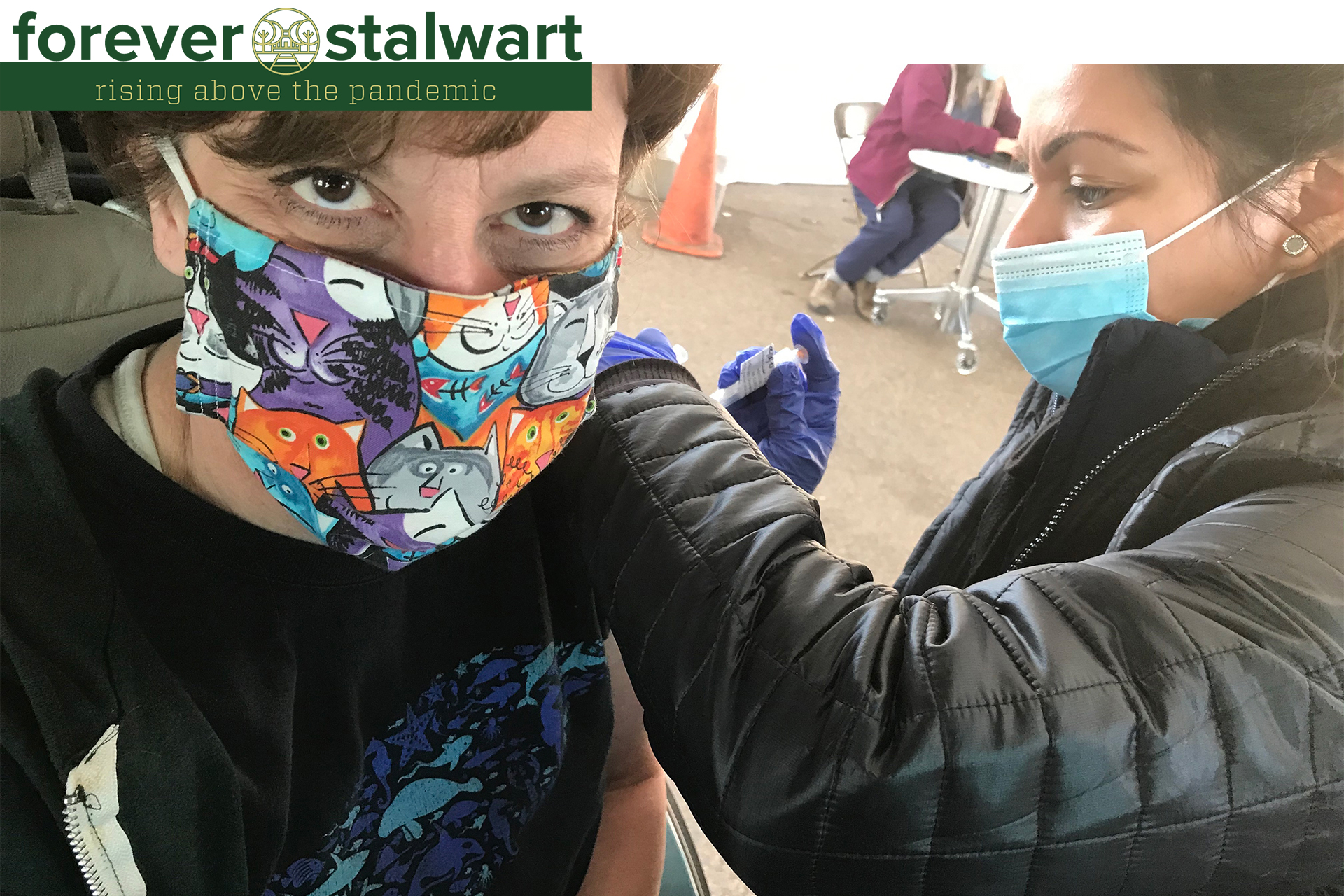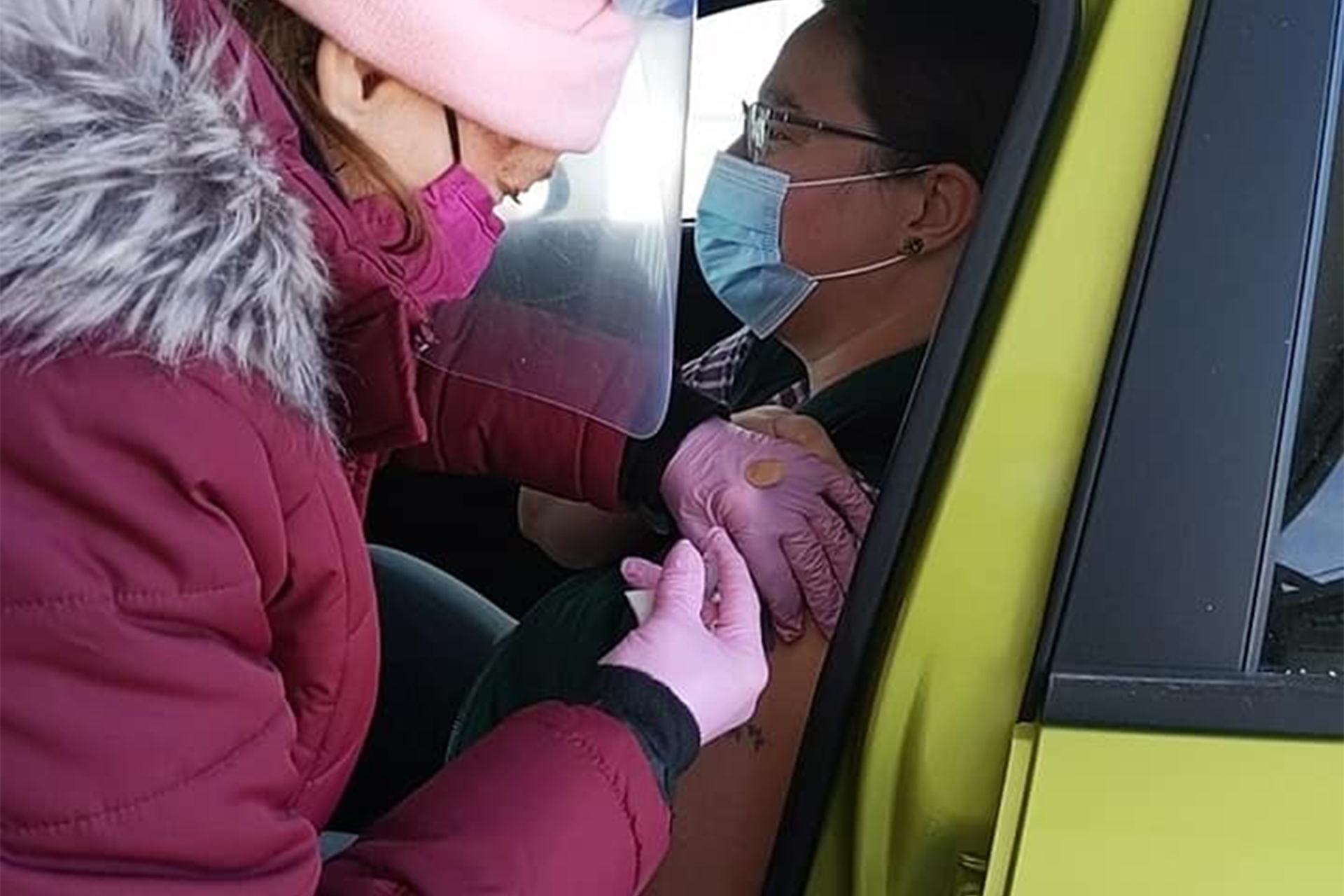
Dr. Kathlene Waller, director of medical clinical services at CSU Health Network, receives the COVID-19 vaccine.
Members of the Colorado State University community have begun to receive COVID-19 vaccinations from Larimer County.
CSU Health Network employees who are seeing patients and CSU Police Department employees who are first responders are among the first at the university to get the vaccinations distributed by Larimer County Public Health. CSU staff working the COVID-19 test collection sites and research lab staff processing the tests also are among those who have been vaccinated.
The state of Colorado is currently in Phase 1A of its COVID-19 distribution plan, which focuses health care professionals and long-term care facility residents.
Spring 2021 at CSU town hall
The Spring 2021 at CSU town hall for the university community on Jan. 15 has reached registration capacity.
The session, which will provide updates and answer questions about the Spring 2021 semester that begins on Jan. 19, will be recorded and captioned for later viewing and posted on the COVID website. The CSU community can still submit questions if they are not registered to attend the town hall. Questions may be submitted prior to the session.
Larimer County Public Health is responsible for vaccine distribution to organizations and businesses within the county, including the university. The county vaccination distribution locations are located at UCHealth, Centura Health, Banner Health, Kaiser Permanente, and Salud Family Health.
CSU’s Pandemic Preparedness Team is currently working with the county on assessing vaccine availability for the university community. More information is available at the COVID Information and Resources website at covid.colostate.edu/kb/vaccinations-for-csu-faculty-staff-and-students.
According to the Pandemic Preparedness Team, the plan for vaccine prioritization and administration to the university community will be communicated to students, faculty and staff soon. Additionally, Team has shared that it will be months before enough vaccine is available to vaccinate the entire university community, likely after the end of the Spring Semester.
A virtual town hall on the Spring 2021 semester is scheduled for Friday, Jan. 15, 9:30-10:30 a.m. The Spring 2021 at CSU town hall has reached registration capacity. The session will be recorded and captioned for later viewing and posted on the COVID website. The CSU community can still submit questions if they are not registered to attend the town hall. Questions may be submitted prior to the session.
Importance of vaccination

The COVID-19 vaccination is given to Wendy McGahey, MSN, RN, quality assurance and compliance coordinator at CSU Health Network.
While the development of the COVID-19 vaccine has been quick, both national and local health officials have said there is no reason to fear it.
A recent statement by the Food and Drug Administration said the two different mRNA vaccines have shown effectiveness of about 95% in preventing COVID-19 disease in adults.
Dr. Kathlene Waller, director of medical clinical services at CSU Health Network, said it is important to note that new mRNA (messenger RNA) technology for these vaccines has actually been under development for 30 years.
Important resources
Vaccinations for CSU faculty, staff and students
covid.colostate.edu/kb/vaccinations-for-csu-faculty-staff-and-students/
Larimer County COVID-19 vaccination information
larimer.org/coronavirus-covid-19/covid-19-vaccine
“Immunologists were ready when scientists in China released the genetic code for the novel coronavirus SARS-CoV-2 last winter,” Waller said. “This new technology is very exciting because it is much easier and faster to create the mRNA from a genetic code than it is to use previous methods of growing a virus and then inactivating (killing) it or extracting a portion of its components to create a vaccine. Effectiveness of 95% is excellent for vaccines.”
Waller said that scientists followed all of the usual procedures for clinical trials to determine the safety and effectiveness of the virus, adding that there have been no safety issues since people started receiving the vaccines in December.
It also is important to consider the alternative of not getting the vaccine and the risk of contracting COVID-19.
“There are still many questions about long-term sequelae from the virus, but we know that there are many serious health complications, including damage to heart muscle and lung tissue, severe prolonged fatigue and muscle aches, and neurologic and psychiatric symptoms that have been found even in young and otherwise healthy individuals after being diagnosed with COVID-19,” she said.
While the vaccine is critical in fighting COVID-19, Larimer County health officials and CSU encourage people to continue following basic public health guidance — social distancing and mask-wearing — until a vaccine is widely available.
Waller said there is a small chance vaccinated people could contract COVID-19. It is still unknown whether persons who have been vaccinated and exposed to COVID-19 could be carriers of the virus even if they don’t become ill themselves, she added.
“The vaccine is just one tool in fighting COVID-19,” Waller said, “and until we are able to achieve herd immunity with the vaccine, it is important for us to use all of the public health measures that we know are effective, such as wearing masks and distancing, to decrease the circulation of the virus in our communities.”
Forever Stalwart: Rising Above the Pandemic
This article is part of the “Forever Stalwart: Rising Above the Pandemic” series, telling the inside stories of how the CSU Ramily has rallied its brilliant minds, great hearts, creativity and collaborative spirit to continue its land-grant mission and overcome the challenges of COVID-19 with innovation and resilience.